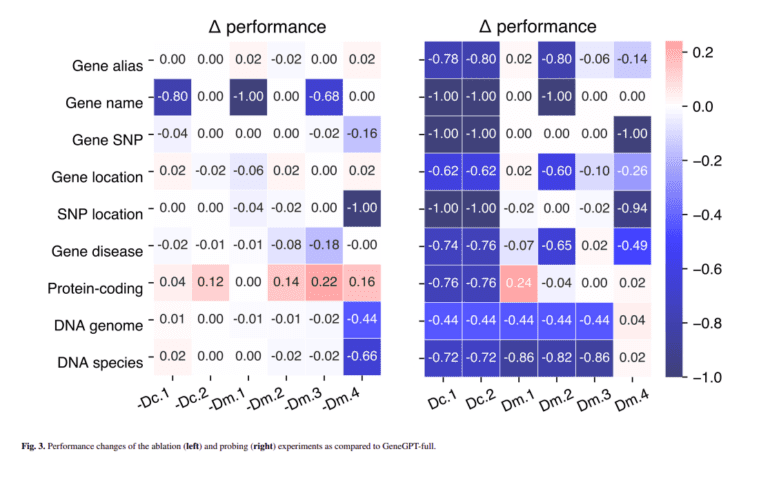TL;DR:
- GeneGPT enhances LLMs’ access to biomedical data through NCBI Web APIs.
- It addresses the challenge of inaccurate responses from LLMs by directly tapping into specialized databases.
- The methodology involves training LLMs to execute precise API calls and retrieve current information.
- GeneGPT outperforms existing models, excelling in complex query resolution with superior accuracy.
- Its success paves the way for broader LLM applications across industries, bridging the gap between models and specialized knowledge repositories.
Main AI News:
The efficacy of large language models (LLMs) has garnered increasing acknowledgment, showcasing their remarkable adeptness in analyzing and deciphering extensive datasets. These models have proven instrumental across diverse domains, from streamlining clinical trial matches to enabling sophisticated biomedical query resolution. However, a notable challenge persists: the propensity of LLMs to produce plausible yet inaccurate responses, often stemming from their inability to reference verified information sources directly. This limitation underscores the critical necessity for methodologies capable of bridging the chasm between LLMs and the precise, domain-specific knowledge housed within biomedical repositories.
LLMs frequently encounter hurdles in accessing precise information from specialized domains like genomics. The crux of this challenge lies in these models’ inherent constraints in efficiently navigating and harnessing data from domain-specific databases. In response, researchers have been exploring innovative strategies to augment LLMs with the capability to directly tap into and interpret data from such specialized repositories.
One groundbreaking solution in this sphere is the advent of GeneGPT, a methodology that significantly amplifies LLMs’ access to biomedical intelligence. By seamlessly integrating LLMs with Web APIs sourced from the National Center for Biotechnology Information (NCBI), GeneGPT empowers these models to execute targeted searches and retrieve information directly from NCBI’s databases. This breakthrough heralds a significant stride forward, enabling LLMs to circumvent the constraints of conventional database queries and access the most current, pertinent biomedical data.
GeneGPT’s methodology revolves around training LLMs to author and execute API calls to NCBI’s Web APIs with precision. This feat is accomplished through contextual learning and a bespoke decoding algorithm engineered to discern and act upon these API requests. Such an approach not only streamlines real-time data acquisition but also markedly diminishes instances of inaccuracies in the model’s outputs. Furthermore, by enabling direct interfacing with NCBI’s databases, GeneGPT guarantees that the retrieved information remains current and highly germane to the user’s query.
The performance benchmark set by GeneGPT underscores its unparalleled accuracy and efficiency in retrieving biomedical insights, surpassing existing models and methodologies. Notably, GeneGPT shines in tackling intricate, multi-step queries necessitating sequential API calls, showcasing its prowess in navigating a series of interconnected inquiries to yield precise responses. This exceptional performance is underscored by an exhaustive examination of the model’s constituents, elucidating the pivotal role played by API demonstrations and documentation in enriching the learning trajectory.
Beyond its immediate applicability in the biomedical domain, GeneGPT’s triumph ushers in a new epoch for LLM deployment across diverse sectors. By bridging the chasm between LLMs and specialized repositories, GeneGPT confronts the challenge of erroneous information retrieval head-on, unlocking fresh avenues for harnessing LLMs in tasks mandating access to specific, validated knowledge. This advancement holds the promise of broadening the horizons of LLM applications, rendering them more adaptable and dependable instruments for researchers and practitioners alike.
Conclusion:
The emergence of GeneGPT marks a significant advancement in biomedical data retrieval, offering LLMs unprecedented access to specialized databases. This breakthrough not only improves the accuracy and efficiency of information retrieval but also expands the market potential for LLMs across various sectors. By addressing the challenge of inaccurate responses and unlocking new possibilities for leveraging specialized knowledge, GeneGPT sets the stage for a transformative shift in how LLMs are utilized, making them indispensable tools for researchers and professionals alike.

